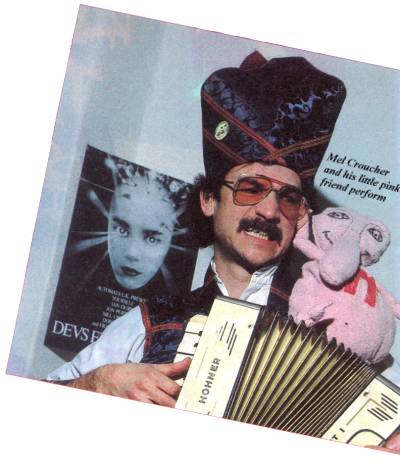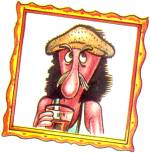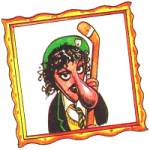| Hit Squad |

Has the dream gone sour on Automata? Chris Bourne meets the happy family
MANITAS de Plobo pulls up at the station in his long-snouted 1950s raven-black jalopy, the Automata equivalent of other men's Porsche Turbos. Manitas de Plobo is one of the many real names assumed by the otherwise fictional character Mel Croucher. It means lead-fingers and when Croucher plays flamenco in Spanish bars Manitas de Plobo is what you get.
Take a look at Croucher as he drives through windy acres of dull drizzling Portsmouth to the warm haven of Dorothy's Wool Shop, heart of Automata and de facto embassy of Piland. He hunches over the wheel and begins to resemble Groucho himself, leaner perhaps, certainly quieter. Croucher makes his noise in the real world, a world of Pimaniacs and multitudes of singing whales swimming free in untroubled oceans. The rest of us live in a monstrous dream decked out in thrilling shades of grey.
Mel Croucher and Christian Penfold, his partner in spreading the word of Pi beyond the bounds of reality, were working together long before they had the fatal idea of selling computer software. Mel describes himself as "An architect. A musician. A painter. Lots of things."
Christian admits to having once been a used-car salesman. "I also did plant hire. Have this lovely geranium. And I used to drive a TDC6 International Harvester. What a way to start life. I never went to school. I'm illegitimate."
He laughs, a sound to turn bone marrow into raspberry ripple. Or was it another demand for food from Lurch, the office parrot? At least, they think he's a parrot.
"That's why we're here," says Christian. "To feed Lurch. He gets really stroppy if you don't feed him."

The Piman with his customary salute |
In those bleak days before the coming of Pi the two met and moved into radio together. They produced a show for the Independent Radio Authority called Whitbread Quiz Time, the drinking man's answer to Mastermind. "And," says Mel, already getting bored with ancient and fictitious history, "We published for Sealink, British Airways, Intasun ... " Travel guides. That was what Automata started as, a publishing company doing travel guides. Then it moved from travel guides to audio guides on cassette.
In late 1981 Automata Cartography created the unforgettable Portsmouth Tapes. "Hello there," begins the commentary, "And welcome aboard this pleasure cruise to the fascinating city of Portsmouth ... Our journey will take about one hour and we'll be cruising at a speed of 17/8 in per second ... my name is Charles Dickens ..."
Automata the software house was born in the middle of the English Channel. "We were doing a guide for Sealink to the Channel Islands," says Mel. "Christian was putting the guide together, and I told him I had bought a ZX-81. He was totally scornful."
On the boat back the first program was written out on 20 sheets of paper. It was supposed to fit into 1K of RAM. "It was bloody great," says Mel. "It was a meeting of film and book."
The first commercial programs were Can of Worms and The Bible. "Good family games with no violence in the best of taste. " And then came the Piman, and nothing was ever going to be the same again.
"We're very interested in artificial insemination," says Christian. "The Piman was not conceived in a test-tube but in a pint mug." Or, as Mel puts it, "He's very big Down Under."

Lady Clair, ravishing in green velcro |
The little pink tearaway with the vast proboscis made his first appearance in Pimania, the text adventure game which appeared in early 1983, with its quest for the golden sundial of Pi, which "really exists. We've got it in a bank somewhere all covered with assay marks. Nobody has cracked the puzzle yet but we bet they'll say Eureka! when they do ..."
The Piman's rapidly developing ego was apparent even then. On side two of the cassette the infamous disco smash-hit-wallop Pimania, as recommended by leading South American torturers, began a series of musical statements which has led magazine reviewers of all ages to be very careful which side of an Automata game is put in the cassette deck first.
"You stole my deaf-aid and I want it back," were the Piman's first immortal words on tape. Or, as his inconstant companion Lady Clair Sinclive says, "Wow, a saxophone. I've always wanted to be in show-biz."
"Pimania is really a mirror of what we are," says Mel. "If you read the wonderful sales figures in the press it was 100,000. When we sold a thousand copies we thought bloody hell's teeth, this is wonderful ... it struck a chord, obviously."
But greed transformed the happy family. For months Penfold and Croucher had been creaming vast profits off the business, paying themselves £24.49 a week and hiring extravagant trestle tables at ZX Microfairs.
"We were mother and father to the Piman," says Mel. "We love all the little Pi-people. Morris, Rastapiman, Swettibitz - he's an intergalactic used-car salesman currently customising Rasta's C5. We were talking to Gremlin Evans the other day and he thinks their personalities are probably more rounded than ours." Gremlin Evans is the cartoonist responsible for the weekly comic strip published on the back page of Another Computer Magazine every week.
Penfold and Croucher apologise for the Piman not being present at the interview. But they insist that he is real. "You think he's one of us, don't you? But he's not. He exists."

The ebullient Rastapiman |
Christian tells how a five-year-old boy telephoned and said his father had told him the Piman wasn't real. "I got the kid's father on the phone and had a go at him. I told him to stop breaking the kid's illusions. Then I told the boy to come along to the Microfair and bring his father along to meet the Piman. I want people to have trust in their software house."
Lady Clair, in whip-cracking form in her new role as a member of the Defect Police, takes time off from duplicating copies of Deus Ex Machina bring more cups of coffee.
"We're not sexist," says Mel. "If I were a skivvy I'd be making cups of coffee." Lady Clair snorts, and curls her thong.
As the afternoon lengthens the shadows of the present loom larger. Most of the games since Pimania have been programmed freelance, many arriving as unsolicited tapes which are then slotted into the Piman legend. Pimania itself was written by Christian, but designed by the two of them together. Mel's ambitions to fit 20 page programs onto the ZX-81 died on the ferry.
Between the launch of Pimania and the creation of the ill-fated and incredible Deus ex Machina the company became known for its espousal of non-violent game concepts, weird cartoons, surreal appearances at ZX Microfairs, and increasingly vocal opposition to what Penfold and Croucher see as the depredations of the middlemen, software distributors and retailers, on the industry.
Automata has always been essentially a mail-order business, and insists that wholesalers pay for what they buy when they order it, the same as other customers.
"We have to instil into people's brains that Automata cherishes its mail-order customers," says Christian. "When you buy something mail order you put a cheque in the envelope and you know you are going to be charged. Wholesalers are reluctant to say 'We want a product. We will sit down and write a cheque."

Dartz-loving Ooncle Arthur |
Penfold and Croucher have been bitterly disillusioned by the lack of response to Deus Ex Machina. Deus is an epic 'computer movie', a game/film/LP with stars like Ian Dury and Jon Pertwee in a synchronised music sound-track. It was written and largely performed by Mel and traces the life of a biological accident in a futuristic machine-world governed by defect police and propaganda. It received excellent reviews in the computer press and was taken up by the national media. Mel was interviewed by Barry Norman; the Sunday Times put it top of its list of games to buy for Christmas. Wholesalers treated it as if it were a plague-carrier.
"Deus truly was the first original audio-visual entertainment since the computer revolution," says Mel. "It didn't come from a bunch of programmers. It was treated like a film, with story-boards painted with felt-tip pens from beginning to end. Then the programmers said, 'it isn't possible.' Six months later it was done."
Everything except the lead vocals was mixed in Dorothy's Wool Shop. A London studio was hired for the vocals at great expense. One incident involved Jon Pertwee, former scarecrow and Time Lord.
"The studio was costing x pounds a minute," says Christian, "and Pertwee was late. He phoned after half-an-hour and said 'Terribly sorry dear boy, I'm going to be late.' I thought that was very arrogant. Then an hour late he walked in wearing a crash helmet and leathers and said 'I've just fallen off my Harley-Davidson.' He was bruised all down one side, but he went into the recording booth with his script and did the job."
So Deus was launched, the game of the movie of the record of the poster, to enormous acclaim. And Christmas came and went, and by the second week of February only 5,000 copies had been sold to major wholesalers.
Christian, becoming increasingly bitter as the afternoon wears on, explodes in quiet fury on his friend's behalf. 'I am tone-deaf," he says. 'I can understand the concept but I cannot follow it all. For Mel it was the crescendo of an idea, an emotional achievement. On my side, I have been flattened by the lack of response and sales despite the wonderful things said about it. I sit here and feel heart-broken at the pathetic way the retailers have handled it.

Lady Clair's daughter Piana |
"I really wonder whether it's all worthwhile. Mel is a creative genius. He put more in and took more out of the Spectrum than anybody has done before.
"But because of our company policy of a fair deal for all, wholesalers have not put it in the shops. It was a wonderful idea, and beautifully packaged, and to be treated in the way it has been ..."
Suddenly it is an ugly, bitter world. The Piman, who stole in to take part in the photo-session, sits on Mel's desk picking at a tape deck with his screwdriver. Christian's voice sinks lower. "My part is to try and get these bastards to part with some money. Our response to mail-order has proved people want it. The wholesalers could not have asked for more backup.
"We play by honourable rules. But Pimania has not been through any major wholesaler. Thorn EMI, Microdealer, Lightning, Websters ... they have not handled Pimania."
The Piman looks up from his tapedeck and says, sadly, "You think it's fun, being a bit of a cult, trying to spend your time spreading joy and happiness through the planet? It's lonely in here you know, waiting for human contact and the opportunity to shine for an hour or two."

Swettibitz, intergalactic salesman |
Plans for the future? Well, the Piman has already decided to release the first Ten Pack, ten Piman games for £10.00 on a single cassette. And Automata has reduced the price of Deus from £15.00 to £10.00 in disgust. "Why give the discount to the wholesalers if they won't buy enough copies to justify it? We're giving the discount to the public.
"What is the point of doing another one - another six months of my life?" asks Mel. "We are still waiting for the public to pick up on Deus. If the cut-off figure is achieved then we'll release what we've had on the stocks for the last six months. We've got plenty of good cheap games for Ten Packs if that's what they want."
Even Lurch seems depressed. He hasn't moved for forty minutes. Christian, sounding anything but, says, "We do it for the bloody love of it. We don't work here. We just come in for fifteen hours a day. We do it for the people who buy mail-order, and for those letters from the kids. We are fortunate that Mel's wife and my young lady are good wage-earners."
Time to go, to trust life and limb to Mel's old black buggy. Croucher and Penfold apologise for the lack of jokes and jollity.
Lady Clair manages a smile. But the final words should go to the Piman, last champion of a world which should be real but somehow gets lost in all the sweat and tears of business. Here's his Christmas message, as heard on The Piman's Greatest Hits Too, available mail order from etc etc.
"Hello everybody, especially Pimaniacs ... another year older, but no wiser I fear ... all in all, not a very good year for our pals in the computer business was it? Talk about bankrupt stock ... here's to absent friends (hic). We weren't in competition you know. Still, what with software piracy, or should I say Theft of Software by all of you out there ... what did you expect?
"Then there's all those stupid advertising rates ... think of a number, double it, add your telephone number ...
"And what with wholesalers taking 50 or 60 percent and not wishing to part with their pennies for several weeks ... (hic)
"Goodbye. Goodbye to all the 87 software houses who are no longer with us . . . hello multinationals with your contract lawyers and your cut-price rotten little programs ...
"Goodbye everybody ..."
END OF TAPE ...
...
(hic)